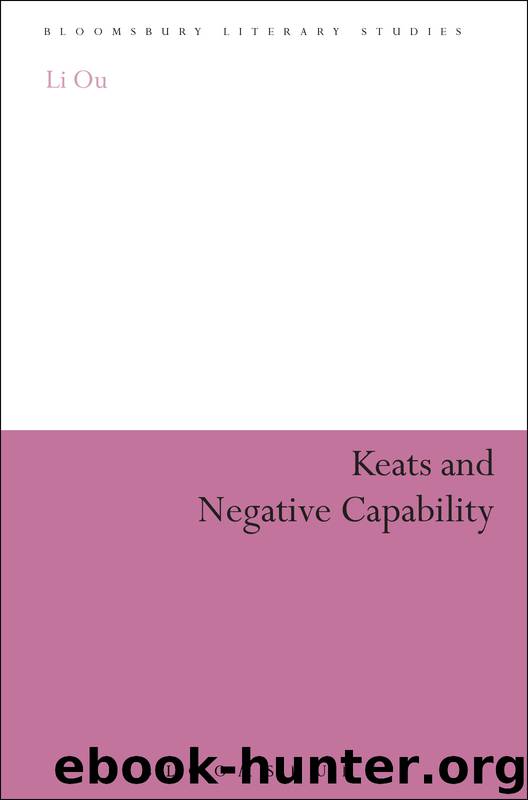Keats and Negative Capability by Ou Li

Author:Ou, Li
Language: eng
Format: epub
Publisher: Bloomsbury Publishing
Published: 2009-03-20T16:00:00+00:00
‘The Vale of Soul-Making’
With the characters, even the antagonistic and the minor ones, ‘swelling into reality’, the dramatic world of Lear projects a vision of the actual complex and diverse human experience, which alone has the power to convey the ‘deep, eternal theme’ of great poetry. Within this tragic dramatic world, Lear, more than any other character, has to experience a trial of his being by going through the most violent vicissitudes, thus epitomizing the tragedy of human existence in himself. If the play approximates the real ‘world of Pains and troubles’, then it is Lear’s heart that is forced to ‘feel and suffer in a thousand diverse ways’ most relentlessly, and this is suggested by Keats’s way of reading the play as well. I do not intend to over-read Keats’s markings, which, like markings by anybody, are likely to be as random as they are telling, but if anything at all can be made out from them, then it is too obvious to escape notice that they are predominantly of Lear’s speeches.11 Keats’s overwhelming attention to Lear has never wavered from the opening to the end, and he has not missed any of the ‘thousand diverse ways’ in which Lear’s heart has had to ‘feel and suffer’.
Once ‘every inch a king’, Lear is the one who, with his very being rooted in his sovereignty over the world, witnesses that world falling apart piece by piece in front of his eyes. The disparity between his opening status and subsequent state becomes so shocking that his very self-identity is at stake, ‘Who is it that can tell me who I am?’ (I.iv.205). What the human heart can endure is pressed to its uttermost limit when Lear has to undergo the atrocious agony of being afflicted by his own flesh and blood, by whom he is reduced to ‘a poor old man, / As full of grief as age; wretched in both’ (II.iv.267–8). He is finally blessed with his only joy in the midst of all these pains, only to be deprived of it and to be tortured by the impossible thought that if Cordelia comes back to life, ‘It is a chance which does redeem all sorrows / That ever I have felt’ (V.iii.265–6). Yet it is in this process of extreme physical and emotional suffering that he has to ‘[e]xpose [himself] to feel what wretches feel’ (III.iv.35), and confront the stark human reality itself that ‘unaccommodated man is no more but such a poor, bare, forked animal’. And it is by going through such a shocking disparity between his self and the greater Other that he is delivered from his wilful blindness to the honest recognition that ‘I am a man’, making it possible for him to reconcile himself with Cordelia and ask for her forgiveness. Moreover, throughout his tortuous experience, he adamantly refuses to succumb to the crushing reality, and in his desperate defiance of the fate that befalls him, the inherent majesty he exemplifies at the same time demonstrates the indomitable majesty of human will.
Download
This site does not store any files on its server. We only index and link to content provided by other sites. Please contact the content providers to delete copyright contents if any and email us, we'll remove relevant links or contents immediately.
Still Me by Jojo Moyes(11248)
On the Yard (New York Review Books Classics) by Braly Malcolm(5520)
A Year in the Merde by Stephen Clarke(5406)
Eleanor Oliphant Is Completely Fine by Gail Honeyman(5268)
The Bookshop by Penelope Fitzgerald(3841)
How Music Works by David Byrne(3255)
Surprise Me by Kinsella Sophie(3107)
Pharaoh by Wilbur Smith(2985)
Why I Write by George Orwell(2944)
A Column of Fire by Ken Follett(2605)
Churchill by Paul Johnson(2576)
The Beach by Alex Garland(2558)
The Songlines by Bruce Chatwin(2548)
Aubrey–Maturin 02 - [1803-04] - Post Captain by Patrick O'Brian(2299)
Heartless by Mary Balogh(2256)
Elizabeth by Philippa Jones(2197)
Hitler by Ian Kershaw(2193)
Life of Elizabeth I by Alison Weir(2068)
Harry Potter and the Cursed Child by J. K. Rowling & John Tiffany & Jack Thorne(2055)
